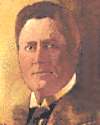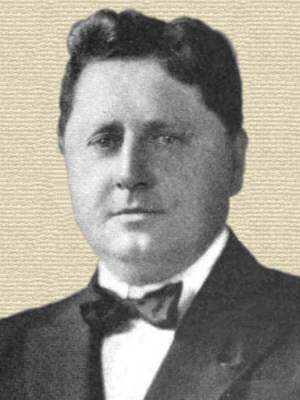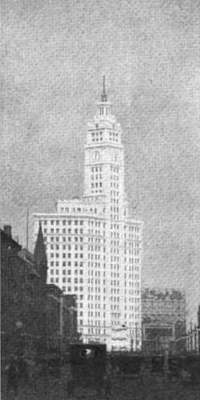 (source)
(source)
|
William Wrigley, Jr.
(30 Sep 1861 - 26 Jan 1932)
American manufacturer who used major advertising campaigns to promote his spearmint chewing gum product and became the world's largest distributor of chewing gum.
|
Make a Good Product for a Fair Price–
Then Tell the World
This Is William Wrigley, Jr.’s, Formula for Success
By S. J. DUNCAN CLARK
from Illustrated World (1922)

William Wrigley, Jr., Came to Chicago in 1891 with $32. After Various Ventures, He Concentrated on Gum, Then Kept Telling the World About His Product, Which Brought Him Unbounded Success. (Terms of Use)
[p.44] Telling the world has been the master strode in the Wrigley enterprise. Where others spent thousands, he spent millions; when others felt it the course of wisdom to retrench and cut down their advertising appropriations, he considered it to be the very time and opportunity to increase them. The bigger his business grew the more necessary he believed it to be to talk to the public about his product. He is still talking about it. Wherever there are newspapers and billboards you will find the familiar symbol of the Wrigley product. The small coins of a score of different currencies flow into the Wrigley coffers, and dimes grow to dollars and dollars to millions; but William Wrigley, Jr., is convinced the flow would dwindle and soon dry up if the spearhead and the slogan failed to appear daily as a reminder to old patrons and a persuader for new.
THE name of William Wrigley, Jr., is a household word in America. In Europe and the Orient and in the remote islands of the Seven Seas they have heard it. Everywhere it is linked in the public mind with the spear-head emblem of his product. “The Flavor Lasts” is a slogan which h as been translated into many tongues and tested by millions of people.
It is not mere idle curiosity which makes people interested in the personality behind a great commercial success, or in the methods by which the success was achieved. Any man who finds his way by enterprise, courage, and hard work to the goal of affluence will command the observation of his fellows, and they want to know how he did it.
The secret of William Wrigley, Jr.’s, success is symbolized by the white tower which stands at the very gateway to Chicago’s throbbing, teeming commercial center. It soars above the murky city— a thing of utility and loveliness. When the evening darkness falls upon the busy streets it can be seen against the sky—a pinnacle of almost ethereal beauty bathed in the soft radiance of electric light.
This is the tower which Wrigley built when success had come to him. It is an extraordinary combination of the practical and the idealistic, of actuality and imagination. This combination is the secret of the Wrigley achievement.
There are two things William Wrigley, Jr., said when interviewed which sustain this interpretation:
“I believe in the other fellow’s right to live. I cannot expect to do well in my business unless he is able to do well in his business.”
That is the substance of the practical idealism which has ruled the commercial methods of William Wrigley,
“Did you find my name anywhere on this building? Did you find any mention of Spearmint on its outside walls?” he asked. “People thought when I began to put this up that I would plaster my name all over it in letters big enough to be seen miles away. If you look when you go out you will find it in small letters over the front door—but you may have to look twice.”
He chuckled.
“As a matter of fact it was better advertising not to plaster my name on the building. People talk more about it. It is the unusual thing—the thing they didn’t expect me to do.”
And there you have the combination of actuality and imagination. The building is the substantial actuality, commanding attention everywhere, but it was imagination approaching genius which saw there was more to be gained by allowing it to tell its own story than by turning it into a billboard.

The practical idealism of the man created a building in which it is a joy to work, not for himself alone, but for all [p.45] those associated with him in his business, from heads of departments to the elevator starter. In the methods which found their permanent monument in the Wrigley tower his practical idealism won the co-operation and good will of those with whom he dealt. He gave his customers good reason to be interested in the success of William Wrigley, Jr., and so they helped to make it.
An imagination which never lost touch with actuality carried him into boldly conceived plans for storming the world with publicity. Condensed, the secret of his achievement in gaining the patronage of multi-millions may be put in the following formula: “Make a good product for a fair price—then tell the world.”
But let him tell his own story. At a guess you would put him on the under side of fifty—and you would guess wrong. He suggests energy, tenacity, persistence. He is utterly without affectation. There is humor in his eye, and a short, crisp directness in his speech.
“I was a city boy,” he said, “born in Philadelphia fifty-eight years ago. I earned my first money taking care of a horse, and I got fifty cents a month. I was only nine years old, and too small to clean it, but I could feed it. I went to the public school, and every few weeks I was fired for getting into mischief. The principal said he liked me, but he just couldn’t keep school while I was in it. I ran away when 1 was eleven, and went to New York—sold newspapers, worked on a sailing vessel, two of ‘em, and then went back home and to school again. I might have stayed in school—I was in the senior grammar class—if I had not thought one day that an over-ripe pie was a fitting decoration for the nameplate on the school building. While one of my companions held my heels, I leaned over and did an artistic job of [p.46] plastering it. That was too much for the principal.
“My father was a manufacturer of scouring soap. He put me to work in his factory. I had to stir the soap in a big pot. It was not an interesting job, so, when I was thirteen, I asked father to make me a salesman. With some persuasion he agreed to try me out. I guess I made good, and that was the beginning of my interest in salesmanship. I learned a lot in the next few years. When I was nineteen I lit out with a chum for the West. We were headed for Colorado, but I lost my hat and our tickets out of the window of the train and we were stranded in Kansas City. I got a job in a restaurant, and later took to selling rubber stamps. Then, with a new outfit of clothes and presents for the folks, I headed home again, and went once more to selling soap.
“In the spring of 1891 I came to Chicago with thirty-two dollars and my experience. I rented desk room in an office on East Kinzie Street, and tried to sell more soap to Chicago. It was hard going for a while. Then I hit on the notion of offering the merchant the premium of an umbrella with every box of soap, raising the retail price to ten cents a cake and giving him at the same time a bigger margin of profit. It worked.
“Since then I have had varied experiences with premiums. I have both made and lost many thousands of dollars through their use. A fellow can’t always guess right, but the balance in the end is on the right side.
“I got into my present business through using chewing gum as a premium with baking powder. The gum became more popular than the baking powder, so I dropped the latter and concentrated my attention on the gum. Then I used premiums with the gum. I gave scales to every grocer who ordered fifteen dollars’ worth of gum. It was a good guess this time. I added other articles that would appeal to a grocer. I kept looking for opportunities to advertise my gum and get it before the people. Other manufacturers were advertising gum as a help to digestion. I saw that mine was displayed on the cash desks of restaurants, where patrons would see it when paying their checks after they had eaten.
“Then I began advertising. I tried out billboards in the South. In 1902 I decided to storm New York with publicity. I spent $100,000 and hardly made a ripple. It was money dropped into a hole, so far as anyone could see. I waited until I had another $100,000 and tried it again with the same result. I tried a third time, after recuperating, and this time with a quarter of a million. I wanted to get the dropped $200,000 back. I did— plus.
“In 1907, when everything was flat on its back and everybody was retrenching, particularly on advertising, I thought it was the ripe hour for a big national campaign. I put $3,000,000 into advertising contracts and covered the country. Men have called it plunging, but I thought I knew what I was doing. Since then we have spent more than $20,000,000 to tell the world about our product. I believe in advertising and I believe in advertising all the time. There is no such thing as getting a business so established that it does not need to advertise. Babies who never heard about you are being born every day, and people who once knew you forget you if you don’t keep them reminded constantly. Dull times are the very times when you need advertising most.
“Today our advertisements are printed [p.47] in a score of languages. We have factories in Chicago, Brooklyn, Toronto and Sydney, Australia. We are turning out nearly ten billion sticks of gum a year. They tell me our four plants turn out enough gum every day to reach from New York to Galveston and pretty nearly bridge the Gulf of Mexico if the sticks were laid end to end.
“There you have the story. There is no rule in this game except to use the best judgment you have, think hard, act quickly, and remember the other fellow has as good a right to live as you.”
Adjoining the office of William Wrigley, Jr., is that of Philip K. Wrigley, vice-president of the organization. It is a father and son concern, and there is no concealing the fact that the president is prouder of the vice-president than he is of the business or the building.
“Any man with the money can put up a building,” he says.
Money is often a handicap to bringing up a son, but as the world knows, Philip K. Wrigley—college man, aviator in the great war and now man of business—proves how well his father overcame this handicap. There are those who say this is his greatest achievement.
- Science Quotes by William Wrigley, Jr..
- 30 Sep - short biography, births, deaths and events on date of Wrigley's birth.
- The Sign of the Spear—The Story of William Wrigley, Who Made Spearmint Gum Famous - from National Magazine (1912).
- Booklist for William Wrigley.




